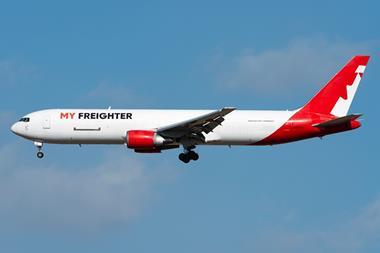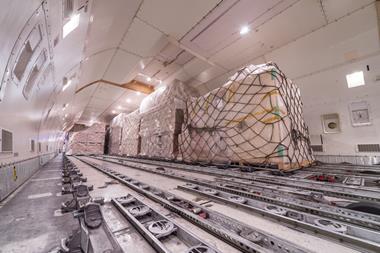Freight forwarders are warning of an air cargo capacity crunch out of key Asian markets during the peak season as new product launches and e-commerce demand put pressure on an already strained market.
In its latest update, Taiwan-headquartered company Dimerco said that the rise in e-commerce demand experienced this year was putting extra pressure on capacity as online marketplaces had signed deals directly with commercial airlines.
"This has further reduced the availability of commercial flight capacity, particularly on routes from China to the US," the forwarder explained.
"Another product category that will contribute to the capacity demand is the consumer electronics market, which will begin its peak season in September."
The forwarder pointed out that Apple had shifted iPhone 16 manufacturing back to China and the first wave of this product is expected to hit the market in September, alongside other new launches.
It said spot rates have already surged to $9−$10 per kg.
Air cargo capacity out of Southeast Asia is also expected to come under pressure due to a rise in multi-sourcing.
"As more production of finished goods has relocated from China to Southeast Asia since 2022, additional capacity is required to transport these products to the US and Europe," Dimerco said.
"This has placed significant pressure on freighter services in key transit hubs like Taiwan, Korea, Japan, and Hong Kong, impacting outbound capacity from these locations as well."
The forwarder recommended that shippers plan their capacity needs at least two weeks in advance, especially for time-sensitive shipments.
The company reported cargo backlogs out of Ho Chi Minh, Hanoi, Singapore and Manila.
UK forwarder Metro said that demand this year had been outstripping capacity additions, which was putting pressure on capacity.
It added that the Red Sea shipping crisis had seen some volumes move from sea to air.
"With the peak shipping season starting in September, air cargo demand is expected to remain robust, particularly in high-demand regions like Asia Pacific," the forwarder explained.
"However, capacity constraints are already evident, with flights on many lanes fully booked.
"The market faces potential additional pressure from reduced belly capacity in [the fourth quarter] and the possibility of strikes at US east coast ports, which could exacerbate the existing challenges."
Metro also urged its customers to plan early.
"Given the current market conditions, shippers are strongly advised to plan ahead and secure airfreight space as soon as possible," Metro said.
"The combination of high demand, potential capacity shortages, and the risk of labour disruptions could lead to an overheated market towards the end of the year, with rates likely to continue rising."
The forwarder asked customers to share forecasts as early as possible to ensure there are no disruptions to supply chains.
A recent webinar from Xeneta and TIACA also highlighted the need for shippers to secure space and make contingency plans as the air cargo market faces capacity shortages out of key Asian markets during the peak season.














